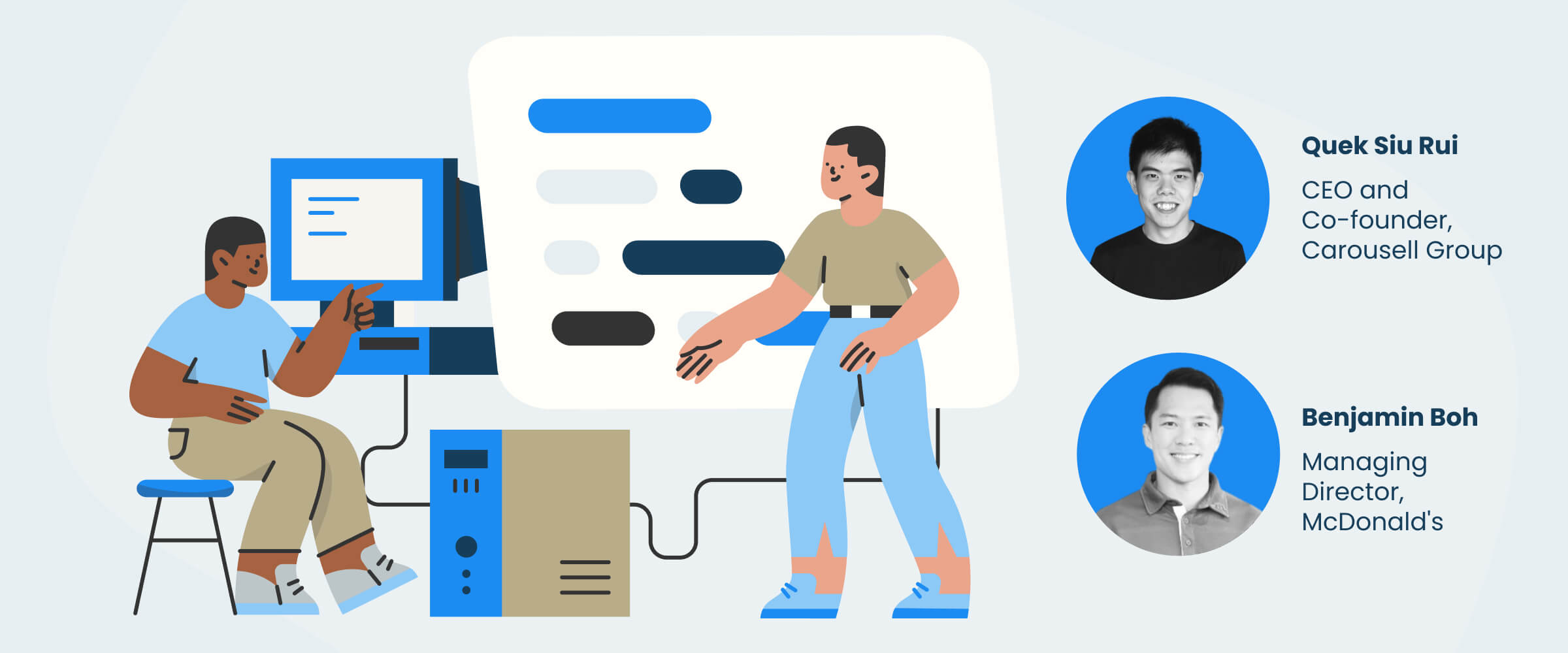For every team of 5, at least 4 are currently at risk of burnout, according to a recent study by Mercer. Even though the worst of the pandemic is over, 81% of employees reportedly feel at risk of burnout in 2022, up from 63% in 2020. This has prompted company leaders to cultivate employee wellbeing and organisational resilience.
Servant leadership—a leadership style that prioritises the growth and wellbeing of an organisation’s employees, customers, and the community at large— fuels some of the world’s most successful companies today. It is why they can attract and retain top talent, keep them engaged, and ramp up productivity.
But where to start? At Mental Health Festival Asia 2022, Benjamin Boh, Managing Director of McDonald’s Singapore, and Quek Siu Rui, Co-founder and CEO of Carousell, shared how they harnessed the power of servant leadership to create organisational cultures that celebrate meaningful work, open collaboration, and mental wellbeing.
They view mental wellness support as employee empowerment
Recognising the human in “human resource” is key to understanding what drives employees and, in turn, performance. After all, people are not serial numbers to be simply allocated and deployed.
“Our teammates are people with their own lives, their own families, their circumstances,” Siu Rui explained. “So, to help them bring their whole selves to work, it’s important that we take care of their overall wellness and mental wellbeing. One thing the pandemic has brought to the forefront was for us to make a deliberate effort to start paying attention to how people are coping [in their personal lives].”
Carousell’s internal programs include Wellness Wednesdays, which range from yoga exercises to sessions on financial wellness; and Blue Sky Fridays, a monthly Friday where no calls, messages, and meetings are allowed. This enables employees to focus on their work without interruptions.
“Personally, as an introvert, it was a godsend for me,” said Siu Rui, who also implemented a flexible-work policy that allowed employees to take charge of their own schedules while remaining accountable to themselves and their teammates.
They focus on winning sustainably
The mission at McDonald’s is “to build a winning and caring team that proudly serves”. To Benjamin, that starts with a culture where teammates don’t just serve customers but also each other. Naturally, it does not promote winning at all costs.
“The winning spirit is not a bad thing, but [we want to build a culture where] you win by caring about the work that you do and caring about the people around you,” he shares.
One of the most transformative things McDonald’s has done is advocating for employees to focus on what is within their control and put themselves first. During the pandemic, the organisation worked on changing the narrative from “everyone is stressed” to “I choose happy”.
“The whole idea of ‘I choose happy’ was a way for us to tell employees, ‘You have a choice. Either you choose to worry about everything, or you choose to take care of yourself and put your happiness first.’,” explains Benjamin. “And that’s where all our mental health awareness and mental wellness support programs come into play. It drives the message from the top down that people are listening, and people care. We’re not just a winning team that looks to win just for the sake of winning, but to win at a sustainable pace.”
They prioritise purpose and open communication

Three manifestations of burnout are exhaustion, cynicism, and feelings of ineffectiveness. At their root is a loss of purpose or meaning at work.
“People need to know their core purpose and know what is important to them personally,” Siu Rui observed. “People run out of steam or start to feel disillusioned is when they’re not quite clear of their anchor or purpose. Once you lose that anchor, that’s when you burn out.” Benjamin echoed this sentiment. “Sense of purpose is important. [The danger comes] when employees don’t talk to each other, so they don’t realise the impact of the work that they do.”
Burnout compounds when a lack of communication leads to employees feeling isolated from one another. “Unfortunately in Singapore, we are used to keeping quiet about our struggles,” he shared. “But we shouldn’t. Keeping to ourselves is what makes us think we’re alone in facing our problems. Talking about it makes it so much better. The more we talk, the more ideas come.” Healthy communication, however, goes hand in hand with psychological safety—the belief that issues can be openly discussed without fear of embarrassment, rejection, or punishment.
They recognise and celebrate good work
Outward praise can be scarce in Asian organisational cultures, but McDonald’s is changing that with their RICO (Recognising Individuals Consistently and Openly) initiative, which encourages employees to acknowledge good work and share best practices openly and collaboratively.
“We started this in 2018 to push forward the culture of recognising people for their good work versus finding fault for their mistakes. It’s less intuitive to say something has been done well and recognise the people doing it,” explains Benjamin.
McDonald’s RICO initiative has been powerful in recognising and appreciating good work within the organisation not only from the top down but also among peers. This in turn created a virtuous cycle that encourages employees to acknowledge one another and take greater initiative in their work.
As Siu Rui summarises, “It takes deliberate effort to celebrate wins, big or small, but it creates a lot of optimism and positive energy in the organisation.”
They give managers the support they need to succeed

Being a people manager is not for everyone, but companies can set them up for success by giving them the necessary toolkits, resources, and coaching to lead and inspire their teams. “It’s important for us to create conditions of success for new people managers, recognise that they will need help, and most importantly give them rope and room to learn, make mistakes, and grow,” said Siu Rui.
Also key to helping managers succeed is to involve them strategically in the company’s growth. “Managers are the ones on the front lines, dealing with their teammates, answering the toughest questions, dealing hands-on with change management,” Siu Rui further explained. “They need the context, they need that information. So consistently feeding them information and bringing them along in the company’s journey is key.”
Leading a team can be isolating, and managers need to know that they’re not going at it alone. It helps to ask them “How can I help you?” or “What resource do you need?”, and create engagement opportunities for them to build support networks within the organisation.
Fostering workplace wellbeing begins with self-care
As much as leaders are instrumental in driving employee wellbeing in the workplace, they should also keep an eye on their mental health. “If you want to make a meaningful, long-term impact, it’s going to be a marathon,” said Siu Rui. “For leaders, it starts with yourself. Wear your oxygen mask first before you help someone else. If you want to help your organisation thrive, you have to keep checking in with yourself and manage your own energy.”
“As a leader, being aware of your own tell-tale signs of burnout is critical to helping you get back to your equilibrium,” said Benjamin in agreement. Emotionally healthy teams start from having emotionally healthy leaders. “If you don’t show up clear and well, you’re going to make poor decisions, and your team will suffer for it. To avoid that, spend more time getting to know yourself and how to overcome your own roadblocks.”
These insights were shared on the Talking About Mental Health: The Leadership Edition panel during our Mental Health Festival Asia 2022. Click here to watch the full recording, or contact us to learn more about how Intellect can help your organisation deliver better employee wellbeing at scale.








